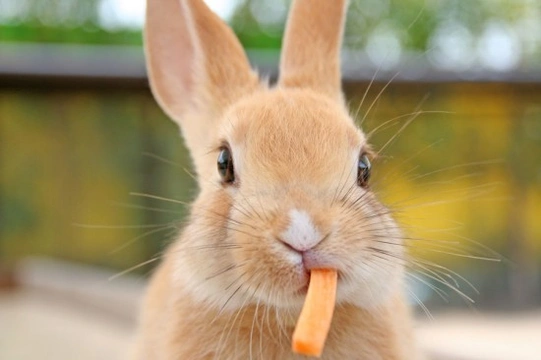
Looking after your rabbit's teeth
Most people know rabbits have two sets of large incisors used for picking, nibbling and slicing vegetable matter, but did you know that they also have smaller incisors just behind the front teeth ('peg' teeth), and a set of 22 upper and lower cheek teeth for breaking down the food into smaller pieces?
Much like horses, rabbits' teeth have evolved to grind down tough, fibrous vegetable matter such as leaves, grasses, stalks and twigs - the natural food of wild rabbits. This need to continuously chew such material means that the teeth of rabbits grow constantly, and because of this the care of your bunny's dental health must be scrupulous.
Not enough roughage
A rabbit whose diet is lacking in enough high-quality fibrous material, such as those on a pellet-only programme, will not wear their teeth down enough and dental problems are inevitable, therefore it's essential your pet's diet meets its dental needs.
When the teeth are underutilised, the top of the tooth (the crown) wears unevenly and will meet its opposite number abnormally. This can lead to the development of sharp edges or 'spurs' which can cut into the cheek or tongue and are usually very painful. These injuries can, in turn, can become infected, causing soft tissue abscesses.
Perhaps more serious, are malocclusions (where the teeth don't meet properly) which create uneven pressure and can cause the roots of the teeth to become impacted and inflamed. Impaction is also very painful and can cause infection of the jaw bone, a serious and potentially life-threatening condition.
Once a rabbit has suffered a malocclusion it is unlikely to ever regain full dental health and will usually require close monitoring and frequent visits to the vet to check the condition of its teeth and mouth.
How to feed for optimum dental health
Twice yearly dental checks and plenty of high-quality roughage are the key to a happy bunny.
Hay (the best quality you can afford) is the single-most important element of your rabbit's diet, not only because it maintains gut function, but because it requires a good deal of chewing - just the thing for your pet's teeth! Experts also suggest offering a mix of different hays, which will provide not only variety for the rabbit, but also a variation in textures which again, is great for those teeth, as the mechanics of chewing for each type will differ, meaning more tooth action and wear.
Limiting the amount of pellet feed will also encourage your fluffy friend to fill up on roughage and keep those teeth working.
It is also helpful to offer your rabbit tough, fibrous tree branches, leaves and twigs. It is important to make sure you gather these from rabbit-safe trees and bushes that have NOT been chemically treated with fertilizers, pesticides or herbicides.
Some rabbit-safe, tooth-friendly treats include:
Apple trees - branches may be feed fresh or driedWillow - branches may be fed fresh or dried Maple, Ash and Pine trees - branches should be dried Rose Canes - remove thorns, branches and leaves may be fed fresh or driedDandelion - stalks and leaves can be fed fresh
So what should I look out for?
It's important that you get into the routine of checking your bun's teeth regularly.
- Make sure your rabbit eats his daily pellet and fresh veg portion eagerly, and that he nibbles hay throughout the day.
- Note any changes in your rabbit's eating habits: ignoring pellets or having difficulty chewing, eating less hay than usual and abnormal faeces are all signs of potential illness.
- Feel the left and right sides of your rabbit's head - in front of the eyes, below the eyes on the cheekbone, and under the lower jaw. If you feel a lump on one side that is not on the other you need to call your vet.
- Gently lift the upper lips to look at the incisors - do they meet evenly? If not, give your vet a call.
- Check for any drooling or excessive wetness under chin (don't worry if your rabbit has a moist chin for a short time after drinking or after eating vegetables).
- If your rabbit gives bunny kisses, you can smell his breath. A rotten pong means a visit to the vet. Beware! Parsley-breath is nice, but poorly mouth-breath can be offensive!
- Eye and/or nasal discharge can also be a sign that something is wrong with your rabbit's teeth.
Be aware! A quiet, nibbling rabbit does not mean it's okay...
In the wild, rabbits are prey animals. They get eaten. A lot. So hiding pain and illness is a strategy they've developed over time to avoid being targeted as easy prey and dispatched by predators.
A quiet, feeding rabbit is not always an indication of perfect health as in the wild it pays to display robust health as far as you can. Domestic rabbits disguise their pain in much the same way as their wild cousins, so it's up to you as the owner to closely monitor your animal and quickly act if even the slightest change in behaviour or condition is observed.
Unfortunately many dental problems can be hidden for long periods before your pet displays any symptoms - it's possible for a rabbit to suffer with a huge abscess or its tongue almost amputated for a long time before it shows any signs of illness.
Small as they are, rabbits are tough and they can't tell you if they're in any discomfort or pain. That's why it's your job to ensure the correct foods are available, their dental health is monitored closely and any problems addressed as soon as possible.



